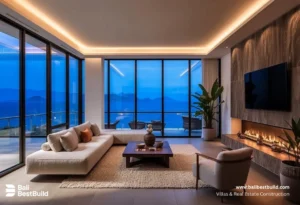Green building certifications are becoming increasingly important in the construction industry as the world grapples with the effects of climate change and environmental degradation. These certifications are designed to promote sustainable and eco-friendly construction practices, and they provide a framework for evaluating the environmental performance of buildings. By adhering to the standards set by these certifications, builders and developers can reduce the environmental impact of their projects and create healthier, more efficient spaces for occupants.
The Importance of Eco-Friendly Construction in Bali
Bali, known for its stunning natural beauty and vibrant culture, has seen a surge in construction and development in recent years. However, this rapid growth has come at a cost to the island’s environment, with deforestation, pollution, and habitat destruction becoming increasingly prevalent. As a result, there is a growing need for eco-friendly construction practices in Bali to mitigate these negative impacts and preserve the island’s natural resources for future generations. By embracing green building certifications, Bali can ensure that its development is sustainable and in harmony with the environment.
Understanding LEED Certification
One of the most widely recognized green building certifications is Leadership in Energy and Environmental Design (LEED). Developed by the U.S. Green Building Council, LEED provides a comprehensive framework for sustainable building design, construction, and operation. It evaluates buildings based on criteria such as energy efficiency, water conservation, materials selection, and indoor environmental quality. LEED certification is available for various types of projects, including new construction, existing buildings, and neighborhood developments. By achieving LEED certification, builders and developers can demonstrate their commitment to environmental stewardship and create healthier, more resource-efficient buildings.
Exploring Green Building Certifications in Bali
In recent years, Bali has seen a growing interest in green building certifications as the island seeks to balance its development with environmental conservation. Several organizations and initiatives have emerged to promote sustainable construction practices in Bali, including the Green Building Council Indonesia (GBCI) and the Sustainable Buildings Initiative Indonesia (SBII). These organizations offer resources, training, and certification programs to help builders and developers incorporate green building principles into their projects. Additionally, there has been a rise in eco-friendly resorts, hotels, and villas in Bali that have achieved green building certifications, showcasing the island’s commitment to sustainable tourism.
Benefits of Green Building Certifications for the Environment
Green building certifications offer a wide range of benefits for the environment. By prioritizing energy efficiency and renewable energy sources, certified buildings can reduce their carbon footprint and lower greenhouse gas emissions. Additionally, sustainable materials and construction practices help conserve natural resources and minimize waste. Green buildings also promote healthier indoor environments by improving air quality and reducing exposure to harmful chemicals. Furthermore, by incorporating green spaces and natural landscaping, certified buildings can support biodiversity and contribute to urban greening efforts. Overall, green building certifications play a crucial role in promoting environmental sustainability and mitigating the impacts of climate change.
Challenges and Opportunities for Green Building in Bali
While there is growing momentum for green building in Bali, there are also challenges that need to be addressed. One of the main obstacles is the lack of awareness and understanding of green building principles among local builders, developers, and policymakers. Education and outreach efforts are needed to promote the benefits of green building and encourage widespread adoption of sustainable practices. Additionally, there may be financial barriers to implementing green building strategies, as initial costs for eco-friendly materials and technologies can be higher. However, it’s important to recognize that green building offers long-term cost savings through reduced energy and water consumption, as well as potential incentives such as tax credits and grants. By overcoming these challenges, Bali has an opportunity to lead the way in sustainable development and set an example for other regions facing similar environmental pressures.
Creating a Sustainable Future for Bali
In conclusion, green building certifications are essential for promoting sustainable development in Bali and addressing the environmental challenges facing the island. By embracing eco-friendly construction practices and achieving green building certifications, Bali can protect its natural resources, reduce its carbon footprint, and create healthier communities for its residents and visitors. Through collaboration between government agencies, industry stakeholders, and community organizations, Bali can establish a framework for sustainable development that balances economic growth with environmental conservation. By prioritizing green building certifications, Bali can pave the way for a more sustainable future that respects its unique natural heritage and cultural traditions.












